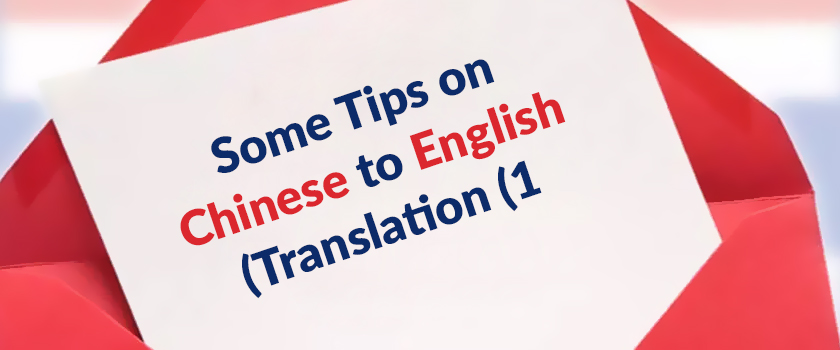I always believe that when doing translation, one should only translate other languages into their mother language, as it is not easy for most people master their own language to the extent that make them a good translator, not to mention other second languages. But if we have to, for example, translate from Chinese to English, here are some advices for those who are new in this field.
Let us look at some examples:
1). 為提供優質客戶服務,XX 現提供中文資訊。
Original Translation: Being committed to excellent customer services, currently XX provides information in Chinese.
Without checking the Chinese source, I would like to change it to:
As part of XX’s commitment to customer services, they now provide information in Chinese.
And after going through the whole context, I would like to translate it this way:
XX now provides information in Chinese for better customer services.
The problem with the original translation is: the awkward structure of the sentence and the bad choice of words.
I do not think “currently” is the best word to use if we have the alternative of “now”. “currently” implies it’s only a temporary measure and is more about at the moment while “now” implies it is now and forever.
Comment: here I want to say, the proper word is not necessarily the difficult word, the point is choosing the right word but not the difficult one. The translator may think using the difficult word could make the translation sounds smarter, but it is not always the case.
2) 加入CARE(加州能源替代費率)的客戶在每月瓦斯和電費賬單上可得到20%的折扣。
Original Translation: Customers joined in CARE (California Alternate Rate for Energy) program will enjoy 20% off on monthly gas and energy cost bills.
Revised translation: Customers joining in the CARE (California Alternate Rate for Energy) program will enjoy 20% off on monthly gas and energy bills.
Comment: Here we should use “joining” instead of “joined” because past participle stands for passive voice while present participle stands for active voice as Non-Predicate Verbs. Here obviously “customers join in the CARE” is active voice. Customers joining in… = customers who join in…
Read Also: Email Marketing Campaign: Q & A—Hong Kong Chinese Translation
3) 是否符合加入本計劃資格,視家庭大小和收入水準而定。
Original Translation: The quality to join in the program depends on household scale and income level.
Revised translation: Whether one is qualified to join in the program depends on the size of the family and the income level.
Let’s look at the definition of household scale:
A household scale is a universal, globally recognised scale for measuring the size of households (defined as a building or structure under which people may live). The Household Scale (named after Paul Household, a 20th century American demographist) has the following grades:
9 : A palace, habitable by upto 150 people
8 : A large mansion, habitable by between 10 and 20 people
7 : A house (for three to six people)
6 : A bungalow (for three to six short people)
5 : A caravan (for two people intent on causing traffic buildups)
4 : A shed (for dirty uncles and their ‘special’ private hobbies)
3 : A tent (for two people who like it moist)
2 : A cardboard box, or newspaper arrangement (for single tramps)
1 : An iron lung (for single people for whom mobility is not important)
In Chinese, it means 一幢建筑物能容纳的人的数量
This is not the phrase we are looking for.
Comment: Only use words and phrases that we are familiar with and whose meanings we are 100% sure about. Picking a word randomly from the dictionary is not always the correct way.
4). 當一個客戶服務代表接通您的電話時,請告訴我們您想要使用的語言,一個持有執照的第三方翻譯員將會被接入這通電話以爲您提供幫助。
Original Translation: When a customer representative picks up your phone, please tell us the language you prefer to use, then a certified third party interpreter will be connected to provide you with service.
Revised translation: Please tell us the language you would prefer to use when a customer service representative answers the phone, and then a qualified interpreter from the third party will be connected to translate for you.
Comment: What kind of service would a translator provide? Of course it would be translating service. So “translate for you” would be better than “provide you with service”. When the literal translation is too long or too awkward to read, we should reorganize the sentence and translate them in a way that more suitable for the target language.
Take a look at how we helped our client by localizing their project for Chinese language. Click here to read the complete case study







